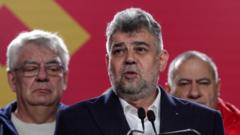The coalition government led by Merz ends a political stalemate, but faces domestic and international hurdles as the far-right gains traction.
New Dawn for Germany: Merz Set to Lead Amidst Political Challenges

New Dawn for Germany: Merz Set to Lead Amidst Political Challenges
Friedrich Merz's election as Chancellor signals a shift for Germany as the conservative leader vows to tackle economic woes and rising extremism.
Germany’s parliament is on the verge of electing Friedrich Merz, a 69-year-old conservative, as the next Chancellor. This marks a significant transition for the nation, bringing an end to a prolonged period of political uncertainty following the collapse of the previous government. Merz is committed to rejuvenating Germany’s economic landscape while solidifying its role on the global stage.
“The obligation to ensure success for this government is historical,” Merz stated as he finalized the coalition agreement with the Social Democrats (SPD) on Monday. His coalition, comprising the Christian Democratic Union (CDU), Christian Social Union (CSU), and SPD, holds a slender majority of just 328 seats in the Bundestag. This narrow lead raises concerns, especially as the CDU saw a modest increase in electoral support, while the SPD experienced a significant decline.
Key priorities for Merz include implementing stricter immigration policies, improving the country’s infrastructure, and reinforcing key alliances within Europe. He has already succeeded in pushing legislation to exempt defense spending from Germany's stringent debt regulations, although experts warn that he will need to gain public support for increased defense expenditure.
In the opposition, the far-right Alternative für Deutschland (AfD) party has emerged as a formidable force, advocating for strict border policies and the cessation of aid to Ukraine. The AfD's recent classification as an extremist group by the country’s domestic intelligence agency has sparked further controversy, with the party accusing the authorities of overreach.
Merz will have to navigate these complexities while attempting to maintain strong relations with the United States. His recent comments advocating for European autonomy from the U.S. have raised eyebrows but he aims to sustain a robust transatlantic partnership.
His initial diplomatic engagements are expected to involve trips to Paris and Warsaw, highlighting the importance he places on rejuvenating Germany’s ties with these nations, especially in the realm of defense collaboration.
Overall, while Merz’s ascension as Chancellor presents a fresh start for Germany, the government must contend with both internal dissent and evolving external relationships.
“The obligation to ensure success for this government is historical,” Merz stated as he finalized the coalition agreement with the Social Democrats (SPD) on Monday. His coalition, comprising the Christian Democratic Union (CDU), Christian Social Union (CSU), and SPD, holds a slender majority of just 328 seats in the Bundestag. This narrow lead raises concerns, especially as the CDU saw a modest increase in electoral support, while the SPD experienced a significant decline.
Key priorities for Merz include implementing stricter immigration policies, improving the country’s infrastructure, and reinforcing key alliances within Europe. He has already succeeded in pushing legislation to exempt defense spending from Germany's stringent debt regulations, although experts warn that he will need to gain public support for increased defense expenditure.
In the opposition, the far-right Alternative für Deutschland (AfD) party has emerged as a formidable force, advocating for strict border policies and the cessation of aid to Ukraine. The AfD's recent classification as an extremist group by the country’s domestic intelligence agency has sparked further controversy, with the party accusing the authorities of overreach.
Merz will have to navigate these complexities while attempting to maintain strong relations with the United States. His recent comments advocating for European autonomy from the U.S. have raised eyebrows but he aims to sustain a robust transatlantic partnership.
His initial diplomatic engagements are expected to involve trips to Paris and Warsaw, highlighting the importance he places on rejuvenating Germany’s ties with these nations, especially in the realm of defense collaboration.
Overall, while Merz’s ascension as Chancellor presents a fresh start for Germany, the government must contend with both internal dissent and evolving external relationships.



















